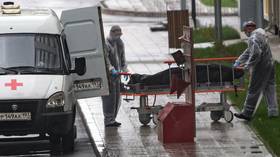Western media concerned coronavirus 'hasn't killed more Russians'

US and allied media outlets seem frustrated that the pandemic isn’t killing more Russians, so they’re claiming the death toll is higher, despite a lack of evidence – while insisting Moscow is the one spreading disinformation.
When the number of confirmed coronavirus cases started accelerating in Russia last month, Western media pounced, presuming the increase would be followed by the kind of spike in casualties seen in the US and many European countries. That hasn’t happened, and the same outlets that were licking their lips waiting for the Russian body count to explode now seem to feel cheated.
A new bottom hit.This @business headline is sacrificing basic ethics for the sake of clickbait.Speak of the media trust crisis.https://t.co/n2G7YbEJQDhttps://t.co/n2G7YbEJQDpic.twitter.com/jVGIDMIzT6
— Maxim A. Suchkov (@m_suchkov) May 14, 2020
“Experts want to know why coronavirus hasn’t killed more Russians,” Bloomberg mused on Thursday, shocking more than a few people with its headline’s air of disappointment. The article’s title was subsequently revised to “Experts question why coronavirus hasn’t killed more Russians,” which is…so much better.
The outlet hinted that a “recalculation” was in the works that would beef up Russia’s death rate significantly, citing an interview with Melita Vujnovic, the lead World Health Organization representative in the country. But Vujnovic only said a “recalculation” might occur – and she clarified on Russian TV on Tuesday that “there are no facts indicating deliberate understating” of the death rate.
The concern-trolling outbreak focused on Russia’s body count struck other outlets, including the New York Times and Financial Times. The former claimed on Monday that Covid-19 death totals in Russia were 70 percent higher than reported, citing “independent demographer” Aleksei Raksha, whom they praised for “spotting” data “buried in an obscure government statistics website.” The irony of using an “independent demographer” (read: non-expert) to manipulate official statistics in order to accuse Moscow of manipulating statistics appeared to be lost on the Times, especially when the same article admitted “the death toll will be updated…by the end of this month” – meaning the numbers they took issue with weren’t even final.
China’s statistics were subjected to the same ghoulish analysis after the country announced in mid-March it had no newly-diagnosed Covid-19 cases. Western outlets insisted that Beijing was merely refusing to test patients, or coronavirus deaths were being covered up as something else. The idea of China beating its own epidemic at the same time the virus was arriving in the US in force and triggering economically devastating lockdowns was clearly a blow to national pride, just as Russia’s “failure” to lose more of its citizens to coronavirus robbed the US of a chance to declare its healthcare system – the most expensive in the world – superior to Russia’s “underfunded” one.
While the Russian Embassy to the US has asked for a retraction from the New York Times, and the Russian Embassy to the UK - from the Financial Times, they’re probably not holding their breath. Smear stories about China’s virus response were a constant presence in Western media during the first few months of the pandemic, and analogous attacks on Russia – from dark speculation that doctors committing suicide are actually being murdered, to claims they’re quitting their jobs en masse – have only just begun.
Also on rt.com Western media excoriates China over coronavirus response, even as infected numbers drop & hospitals closeNoting that NATO Secretary-General Jens Stoltenberg had accused Russia and China of “spreading a lot of disinformation during the Covid-19 pandemic, trying to change the world order,” Russian Foreign Ministry spokeswoman Maria Zakharova drily observed in a Facebook post on Thursday that a ‘world order’ in which it’s considered acceptable to lament why a virus didn’t kill more Russian people could probably use a change.
Like this story? Share it with a friend!














